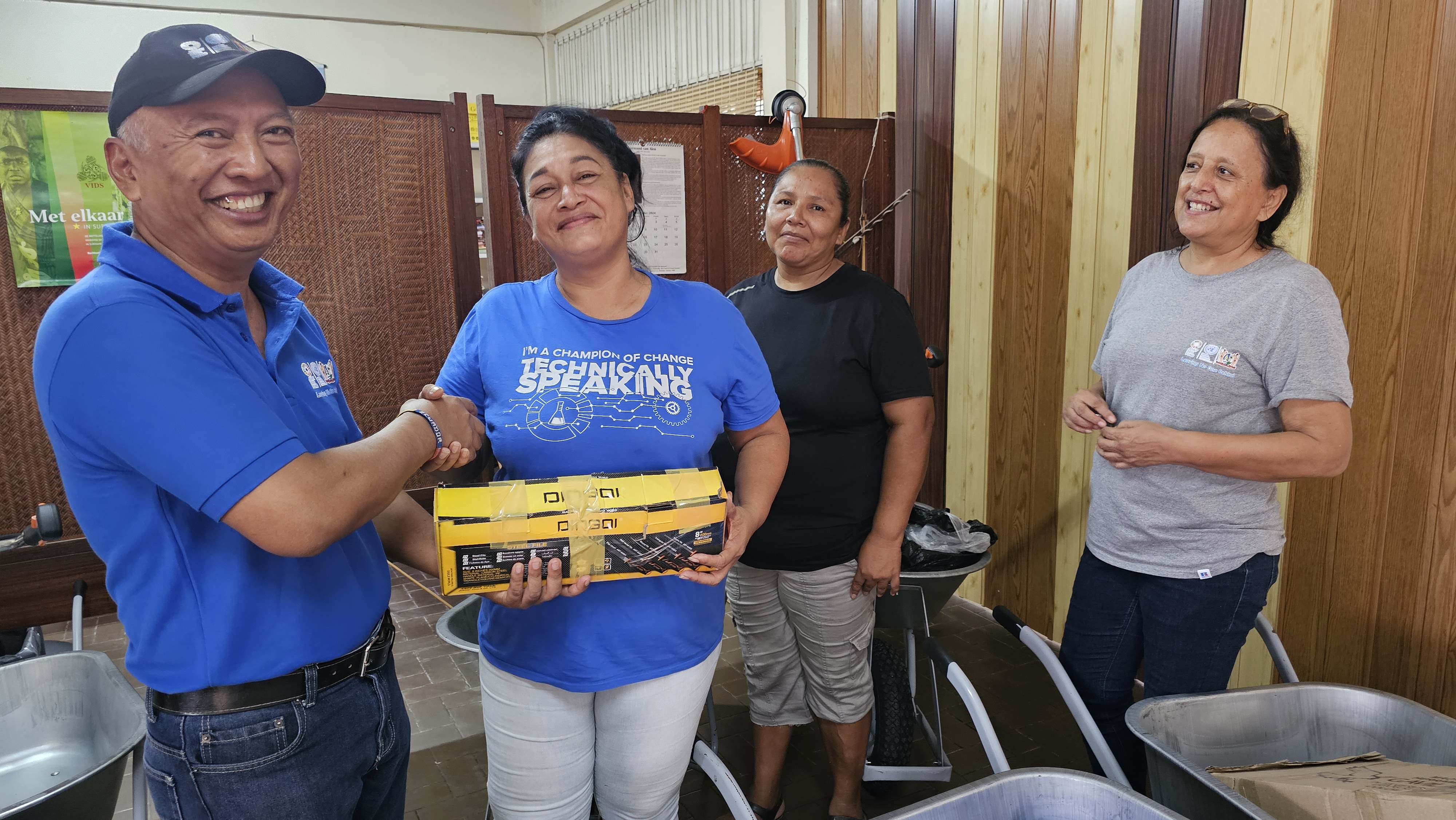This programme is a collaborative effort between the Government of Suriname, led by the Ministry of Regional Development and Sport, Indigenous and Tribal umbrella organizations VIDS and KAMPOS, and UN agencies including UNDP, UNICEF, UNFPA, FAO, and UN Women, coordinated by the UN Resident Coordinator with technical leadership from UNDP .

Handover of hand tools and equipment to a delegate of the women of Apoera and Section. In the picture from left to right: Marcia Jarmohamed,VIDS contact person West Suriname; Ruben Martoredjo ,Programme Officer UNDP; Mrs. Jacqueling Sabajo , Apoera & Marie-Josee Artis,VIDS.
The women of Apoera and Section have received hand tools and materials to support their initiative in producing highland rice. This effort is part of the Joint Programme "Leaving No One Behind, Building Resilience, and Improving Livelihoods of Indigenous and Tribal Peoples (ITPs) in Suriname," (JP LNOB) specifically Output 1.3, which aims to enhance livelihoods and food security for female farmer networks in targeted ITP communities. The programme intends to expand this initiative to neighboring villages as well.
This programme is a collaborative effort between the Government of Suriname, led by the Ministry of Regional Development and Sport, Indigenous and Tribal umbrella organizations VIDS and KAMPOS, and UN agencies including UNDP, UNICEF, UNFPA, FAO, and UN Women, coordinated by the UN Resident Coordinator with technical leadership from UNDP .

Inventory of hand tools and equipment. L-R Ruben Martoredjo (UNDP), Marcia Jarmohamed (VIDS contact person West Suriname), Mrs. Jacqueling Sabajo , Apoera and Marie-Josee Artist (VIDS)).
This initiative builds on UNDP’s previous project aimed at mitigating the impact of COVID-19 on Indigenous and Tribal Peoples (ITPs) in Suriname. The project created income-generating opportunities for ITP women to support economic recovery and effective crop production using new technologies & improved plot and crop management.
Four crop production pilots have been implemented in two Indigenous and two Tribal villages. In the Indigenous village of Washabo, the pilot focused on highland rice production. Women in Washabo received training, guidance, materials, equipment & hand tools to support their initiative.
Encouraged by Washabo's success, the women of Apoera and Section expressed their interest and requested support during a meeting with UNDP and GEF/SDG programme staff in November 2023.

Village chief of Washabo, Captain Sri Sria, presented the rice mill to the women, witnessed by the Resident Representative, Mr. Gerardo Noto, and Deputy Resident Representative of UNDP, Mr. Berdi Berdiyev.
During this field mission, a mobile rice processing machine was handed over by the Resident Representative of UNDP to women of Washabo to process their harvest effectively.
In collaboration with VIDS, preparatory actions were undertaken, resulting in the handover of tools and equipment to the women of Apoera and Section. Similar to Washabo, these women will receive training and technical guidance from a local expert in growing highland rice in June 2024.
This initiative, also under JP LNOB, will be led by FAO in collaboration with VIDS. Through these efforts, the JP LNOB programme continues to empower Indigenous and Tribal women, fostering resilience and improving livelihoods in Suriname’s hinterland communities.

 Locations
Locations